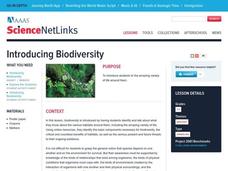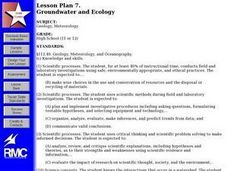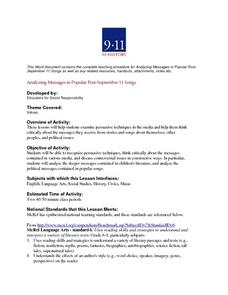Curated OER
Introducing Biodiversity
Students are introduced to the life around them. As a class, they discuss their prior knowledge about the habitats in their local area. Using the internet, they identify the basic components needed for biodiversity and the major...
Curated OER
Let There Be Light
Fifth graders explore electricity. In this electricity instructional activity, 5th graders experiment with open and closed circuits. Students determine how to properly connect a battery and bulb to illuminate the bulb.
Curated OER
Floating Soap
Learners explore the density of soap. In this science instructional activity, students conduct an experiment to find which types of soap will float. Learners make a hypothesis and record their observations.
Curated OER
Double Trouble?
Students investigate cloned meat and animal products. In this food safety lesson, students research the noted Web sites in search of information about cloning and food labelling. Students use their findings to create informative...
Curated OER
The Baltic Sea
Students study the Baltic Sea and the bordering countries. In this environmental lesson students study changes in environment and develop a sustainable future.
Curated OER
Groundwater and Ecology
Learners are presented a problem concerning an aquifer which may be in danger from overuse by agriculture/industry. They compile data and consult online data and experts in creating a proposal to rectify the situation.
Curated OER
Jurassic Park Debate
Students research behavior, phsyiology, and ecology of dinoaurs. Students role-play as scientific specialists such as geneticists and ecologists. They present their research findings in a research paper.
Curated OER
Panther Scavenger Hunt
Learners research the Internet to fill out their scavenger hunt sheet. In this research lesson students search the Internet for answers to the questions on the scavenger hunt worksheet.
Curated OER
How Much Energy is a Kilowatt Hour?
Students study the conservation of energy. In this energy instructional activity students explain the differences between potential and kinetic energy.
Curated OER
Environmental Action
Students investigate an environmental problem in order to find and propose possible solutions. The problem is real to add to the engagement of the instructional activity. This is found through conducting research and then brainstorming...
Curated OER
Wonderfully Wild Unit
Students explore the ethics of 'fair' in regards to humans relationship with wildlife. In this wildlife study lesson, students read the story starters about wildlife and then discuss how to finish the story. Students finish the stories...
Curated OER
Walking the Talk
Students research production, consumptions, and disposal of everyday items and their ecological impacts. In this sustainable economics lesson, students discuss clothing and various items used everyday in groups. Students then study a...
Curated OER
Media/Book Review
Young scholars act as media critics to analyze the portrayal of the elderly in media. In this ethics lesson, students use the Internet to research ageism. They decide if various media depict elderly characters positively or negatively.
Curated OER
Foodborne Illness Educational Materials
Learners work in teams to research and create educational material succinctly summarizing known salient fact, including prevention, of a particular foodborne illness. Pupils educational materials are presented in both oral and written...
Curated OER
Darwin, Politics, and Religion
High schoolers gain an understanding of the Darwinian theory of evolution, examine how Darwin's theory has been adopted by ruling elites in order to justify their position in power, compare religious and historical responses to Darwin's...
Curated OER
Cyberspace
Students examine how the Internet has made music and art more available to the public. In this cyberspace lesson plan students create their own works of art.
Curated OER
Lead Detection
Pupils explore one method for the detection of lead in soil. The detection of the presence of lead in soil can be determined sensitively using inexpensive swabs. Pupils collect several spoonfuls of soil from various parts of their yards...
Curated OER
911 As History
Middle schoolers recognize persuasive techniques, think criticaly about the messages contained in various media, and discuss controversial issues in constructive ways. They analyze the deeper messages contained in children's literature,...
Curated OER
Protecting the Past: Give a Hoot, Don't Loot!
Students, in small groups, simulate an ancient civilization and the art they created, another group represents vandals, and the final group represents archaeologists who try to figure out what life was like for the "ancient peoples". ...
Curated OER
Behavior Code
Students develop codes to guide individual actions and responsibilities as members of the team. They explore memories, journal entries, etc. about
about teamwork. Through prompting questions, they translate these into a
draft behavior...
Curated OER
Human Genome Debate
Learners study the Human Genome Project and participate in a debate about the project. In this genome lesson, students review the terms related to the genome project, take a poll about the ethical issues of the project, and watch a video...
Curated OER
Ethical and Personal Decisions
Students will learn about the current technology of genetic testing within the
framework of the biology curriculum through a lesson-produced PowerPoint presentation: "Genetic Testing" at: http://jbois.tripod.com/index.html.
Curated OER
Science: Exploration Tubs
First graders develop skills of scientific inquiry. They determine which objects float and which sink.
Curated OER
Innocent or Guilty: A Lab on DNA Gel Electrophoresis
Learners use the prelab as an introduction to the importance of DNA fingerprinting- a form of identification that us being accepted by both scientific and leagl experts. They prepare a gel for electrophoresis. DNA fragments, which have...























